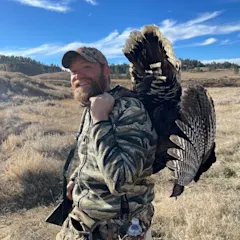Hundreds of thousands of acres of federally managed lands in Utah and Nevada could soon be sold in a convoluted and fast-moving effort to balance the nation's budget. The highly controversial public land sell-off plans were forced into a reconciliation package in the middle of the night on May 6 and then quickly passed by the Republican-dominated House Committee on Natural Resources. Hunting and fishing conservation groups—which have opposed the inclusion of public land sell-offs in the budget package from the start—are now ringing alarm bells as the House budget bill heads to the Senate.
Representatives Mark Amodei (R-NV) and Celeste Maloy (R-UT) introduced their 33-page amendment at the tail end of a 13-hour budget hearing that saw no mention or debate of public land sell-offs. A representative of Trout Unlimited who has followed the process closely tells Field & Stream that it aims to "put somewhere north of half-a-million acres of public land on the auction block." While most of the targeted parcels are managed by the Bureau of Land Management (BLM), there's also a provision that would sell off US National Forest lands in Washoe County, Nevada.
Hunting and angling groups and public land advocates across the spectrum have been guarding against public land sell-off plans since early April, when a widely-read Politico story outed House Republicans' plans to dispose of federal lands as a way to bankroll proposed tax cuts and other budgetary measures.
According to Madeleine West, Vice President of Western Conservation at the Theodore Roosevelt Conservation Partnership (TRCP), the sale of federal lands during budget reconciliation sets a troubling precedent that could lead to more public land sell-offs during future budget negotiations. "The House version of the bill that was publicized and considered for mark up did not include any mention of public land sales," says West. "We have opposed this since the plan was leaked several weeks ago. We issued an action alert then, and more than 6,000 American sportsmen and women voiced their concerns to their members of Congress saying this budget bill is not the place to consider public land sales."
West says the amendment circumvents established laws that guide any proposed sales or swaps of BLM or Forest Service land. "This amendment says that the money from the sale of our public lands would go into the US Treasury," she says. "But in the Federal Land Transaction Facilitation Act (FLTFA), there is a clear administrative process that says the proceeds from federal land sales must go into an account that reinvests in our public land system.
Instead of being used for the budget, money from the sale of public land is supposed to improve existing public lands or provide additional or expanded public land access."
The late-night amendment also cut the public's voice out of the process, West adds. "It does not include any local community input or engagement around whether these sales should even happen," she says. "It doesn't evaluate public benefit at all. They just made a unilateral decision in the wee hours of the night."
TRCP is one of several conservation organizations that's gone on the offensive since the amended budget reconciliation bill was passed. In a statement shared with Field & Stream, Trout Unlimited said that Celeste's and Maloy's amendment was tacked on without any transparency whatsoever. “There is a time and a place for everything," said TU President and CEO Chris Wood. "There are mechanisms that allow for proper consideration of federal land transactions. The time for selling off thousands of acres of public lands is not right before midnight, and the place to do so is certainly not in a tax bill. Public lands are the backyard of the little guy. Dark-of-night actions such as this could transition them to the playground of the wealthy.”
Backcountry Hunters & Anglers (BHA) voiced their concerns in a press release issued yesterday saying the move erodes public trust and violates bipartisan land sale safeguards. "Public lands are not for political shortcuts. They belong to all of us," said BHA. The National Wildlife Federation (founded by Ding Darling in 1936) also weighed in, calling the amendment "a lose-lose proposition for wildlife, clean air and water, outdoor recreation, rural communities, and taxpayers. "
The Boone & Crockett Club and the Wild Sheep Foundation have raised alarms about public land sell-offs in recent weeks as well. "The complete value of our public lands has overcome all past attempts to dispose of it," reads a statement issued by B&C on April 23. The club was created by Pres. Theodore Roosevelt in 1887 and has been in continued existence ever since. "These lands are too valuable to give up and hunters, ranchers, miners, foresters, farmers, recreationists, and the rest of the outdoor economy have reasons to agree. Many are saying so. All should."
Many conservationists were concerned about impacts of the House's new budget package even before public land sell-offs were woven in. Most notably because it opens the door for the elimination of hard-won protections for Minnesota's Boundary Waters Canoe Area Wilderness and approves a 200-mile industrial mining road through the heart of Alaska's pristine Brooks Range known as the Ambler Road.
Read Next: Majority of Americans Oppose Public Land Sell Offs
According to TRCP's West, there is a process known as the Byrd Rule which could allow the sitting Senator Parliamentarian to remove the amendment on "procedural grounds." Whether or not the Senate will actually take up the fight appears to be anyone's guess. "They could remove it if they decide to," West says. "But it's not a given that that is going to happen." Field and Stream will continue to follow and update this developing story.


